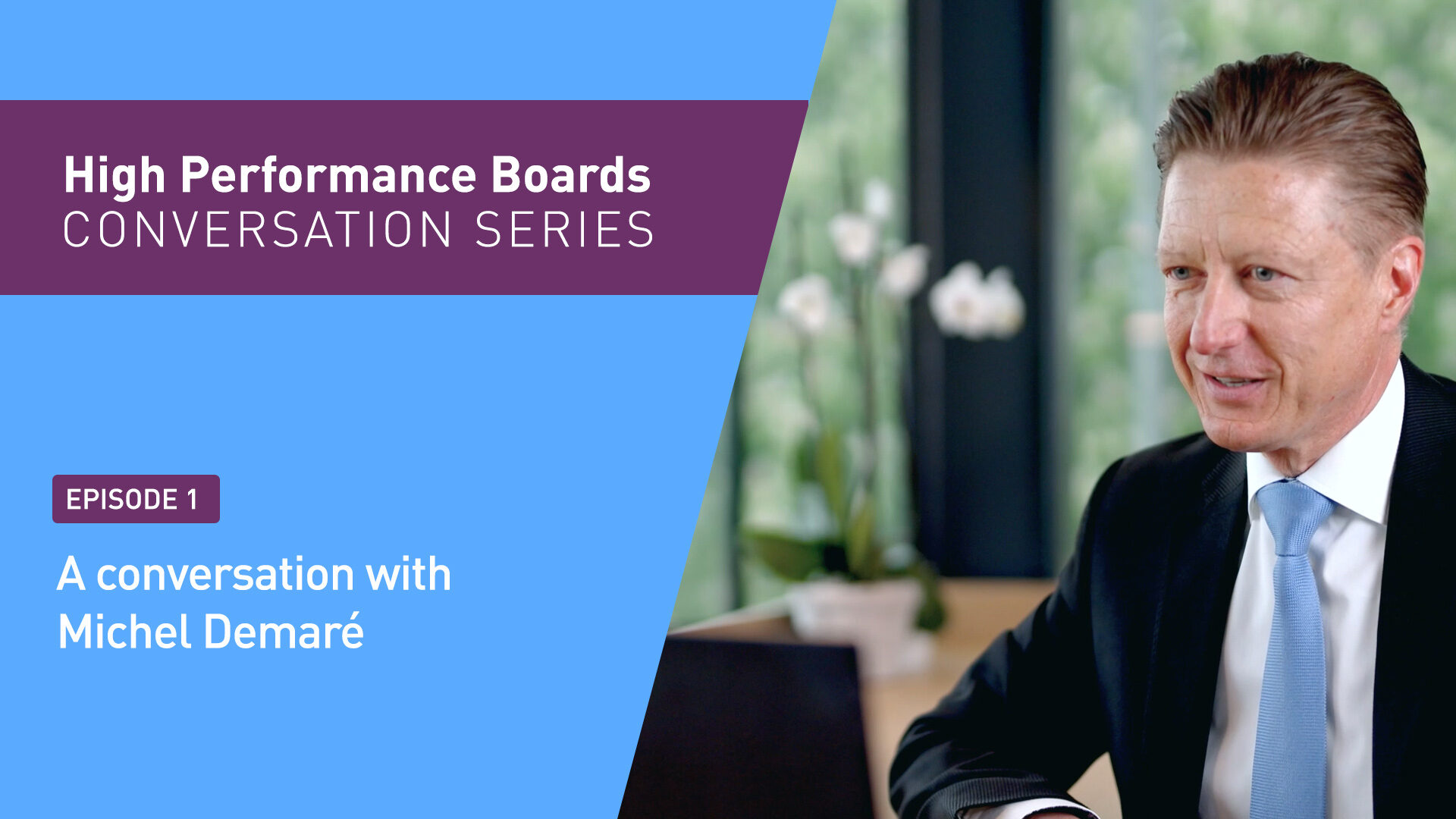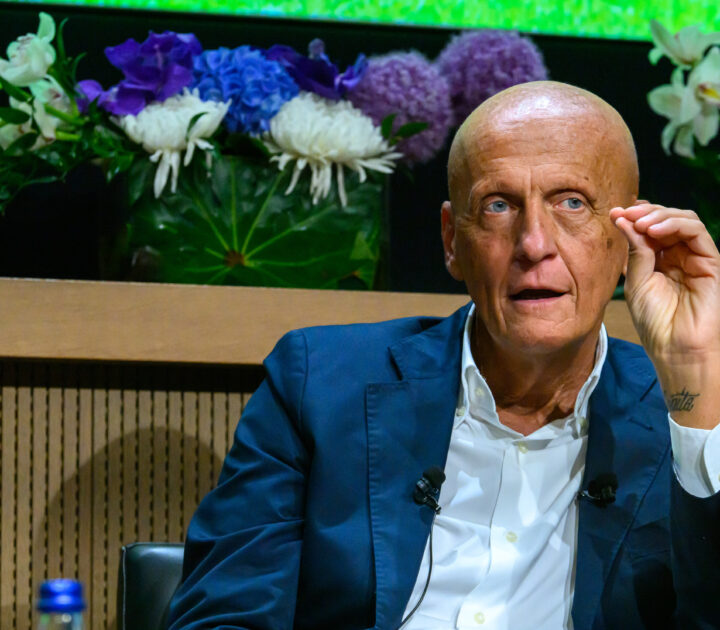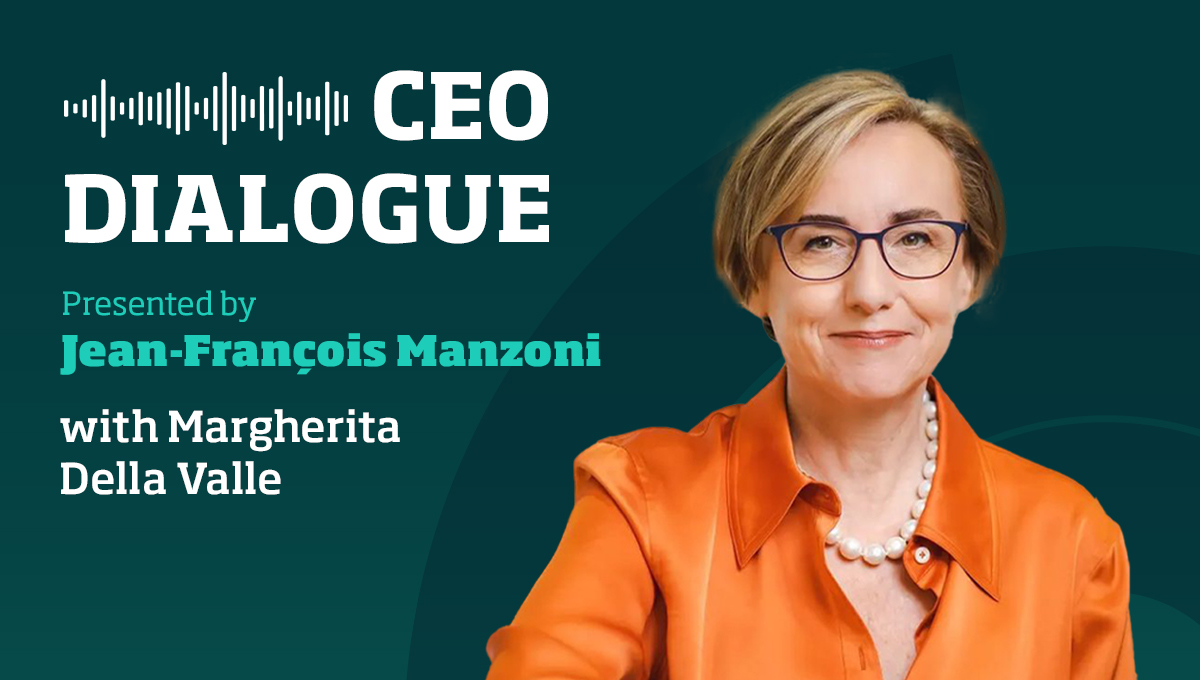High Performance Boards Conversation Series

This stimulating new series with Didier Cossin, Professor of Governance and Founder and Director of the IMD Global Board Center, hosts well-known board members and chairmen/chairwomen to discuss best governance practices. Inspired by Professor Cossin’s recent book of the same title, High performance boards delves into topics such as accountability, responsibility and stewardship, amongst others.
With decades of influential tips, advice and examples from both Professor Cossin and those of his expert guests, this series is essential viewing for today’s board members, senior managers, investors, lawyers and students of governance.
In the first episode, Chairman of the IMD Foundation and Supervisory Board, Board Member of Vodafone Group PLC, Astra Zeneca PLC and Deputy Chairman of Louis-Dreyfus Company Holdings B.V. Michel Demaré examines how the role of the board is changing due to the COVID-19 crisis. He urges boards to consider the bigger picture concerning current challenges, including the health and well-being of employees in addition to bottom lines.
Demaré answers the question of what makes a great board member and emphasizes that stakeholder communications should be prepared well in advance.
Professor Cossin and Demaré finish the conversation by discussing sustainability and stewardship, and how it relates to boards today. Demaré provides his advice for addressing diversity and social inequality, pointing out the COVID-19 crisis has only intensified certain injustices.

The second episode of the series, “Board lessons from humanitarian governance“, features President of the International Committee of the Red Cross Peter Maurer. Maurer, one of Switzerland’s top diplomats, explains specific challenges that concern humanitarian organizations like his own.
The Red Cross is arguably the largest and one of the most sophisticated humanitarian organizations in terms of governance – it enters major conflict zones in difficult situations. All businesses that are entangled in complex geopolitics can learn from how the ICRC is able to maintain its neutrality while maintaining purpose.
Cossin and Maurer explore the topic of diversity and inclusion, specifically the unique role of the ICRC and its governance structure. Alongside purpose and geopolitics, they agree that diversity is at the heart of good governance for all boards.

In the third episode, “Top board priorities for organizational health“, IMD Professor of Governance Didier Cossin explores the topic of stewardship and how organizations can create true value with Chairman of Nestlé, Vice-Chairman of L’Oréal and Board Member of Roche Paul Bulcke.
With Nestlé’s “Creating shared value” program, the world’s largest food company has put stakeholders and society firmly at the heart of its operations, Bulcke says. He believes a Nestlé trio of values – safety, activity and solidarity – has allowed the company to thrive despite the ups and downs of 2020.
Bulcke says boards can play a vital role in keeping companies healthy during the COVID-19 crisis and beyond if they follow certain steps, including favoring resilience and not only efficiency, fostering strong management and keeping priorities straight, amongst others.

In episode four, “The principles of post-COVID stakeholder engagement in the pharmaceutical industry” Cossin engages in conversation with Roche Chairman of the Board Christoph Franz on the matter of different stakeholders and how the Board works together to engage with them.
“The more diverse you are the more you can have an educated look at the opportunities and risks that are developing in case of crisis,” says Franz, underlining the importance of having invested trust across the Board prior to crisis so that you can benefit from it should crisis strike.
COVID has made us sit up and think, and remember why we are doing things, the two agree. In the case of Roche, the spotlight has fallen heavily on one of the main stakeholders – the patient. Franz answers questions on how the firm is working from the vantage point of the Board to have a patients’ view.
Of course having one single view from the Board on any stakeholder is hard, and Franz explains how at Roche the existing culture in the company – “the alignment in the Board” – was an asset they benefitted from. “You do not have to agree on everything but we are in a privileged position to master the crisis. So, we have to think how we can deliver this in the best way,” Franz explains.
Cossin and Franz also discuss how Roche has balanced different shareholder and stakeholder concerns as it has drawn more heavily on its “diagnostic arm” during the COVID crisis, using its diagnostic tests and existing medicines to alleviate the burden of COVID-19.
A focus on profitability has to some degree given way to collaboration with competitors, in the name of speeding up and co-developing effective medicines. Also, there is more a sense of working in parallel, for instance with medical approval authorities, we learn.
The sharing of capabilities has never been so pronounced, Frank explains, speaking of his hope to create a lasting legacy that can be used in post-COVID times to benefit from innovative medicines and diagnostic tests faster to patients.

In the fifth session of the series, President of the International Olympic Committee (IOC) Thomas Bach discusses the challenges of sports governance – with regard to social and technological transformation – with Professor Cossin at the IOC’s iconic headquarters in Lausanne, Switzerland.
Strengthening governance as a key driver of organizational decisions is the secret to keeping the flame of the Olympics alive, according to Bach. As the glue that holds the organization together, the IOC’s Executive Board has implemented measures for accelerating decisions, increasing diversity and reducing doping.
The ability to make sound and swift decisions in such an unpredictable environment is made possible only by the flexibility of the IOC’s governance team – and this agility is paramount to effective board decision-making.
“We live in a world where fragmentation and politicization are dramatic,” says Professor Cossin, asking Bach how the Olympic Movement can fulfill its mission in a world filled with such tensions.
Bach explains that solidarity is in the DNA of international sports, leading the two to the topic of diversity and what exactly that means for the IOC as such a wide-reaching organization.
“We have to concentrate on our mission,” says Bach, “and our mission is to unify the entire world through sports.”

Research Information & Knowledge Hub for additional information on IMD publications
Many executives say they don’t have time for mindfulness practices, such as daily meditation. An alternative is micro-presence: weaving moments of ...
Technological innovation, advances in remote work, and reshaped post-pandemic priorities have led to companies hiring fractional leaders, or part-t...
In recent years, sustainable leadership has emerged as a powerful force reshaping corporate strategies worldwide. At its core, sustainable leadersh...
Research Information & Knowledge Hub for additional information on IMD publications
Research Information & Knowledge Hub for additional information on IMD publications
in I by IMD 5 July 2024
Research Information & Knowledge Hub for additional information on IMD publications
in HBR.org 2 July 2024
Research Information & Knowledge Hub for additional information on IMD publications
in I by IMD 28 June 2024
Research Information & Knowledge Hub for additional information on IMD publications
Research Information & Knowledge Hub for additional information on IMD publications
Research Information & Knowledge Hub for additional information on IMD publications
Research Information & Knowledge Hub for additional information on IMD publications
in I by IMD 19 June 2024
Research Information & Knowledge Hub for additional information on IMD publications
Research Information & Knowledge Hub for additional information on IMD publications








